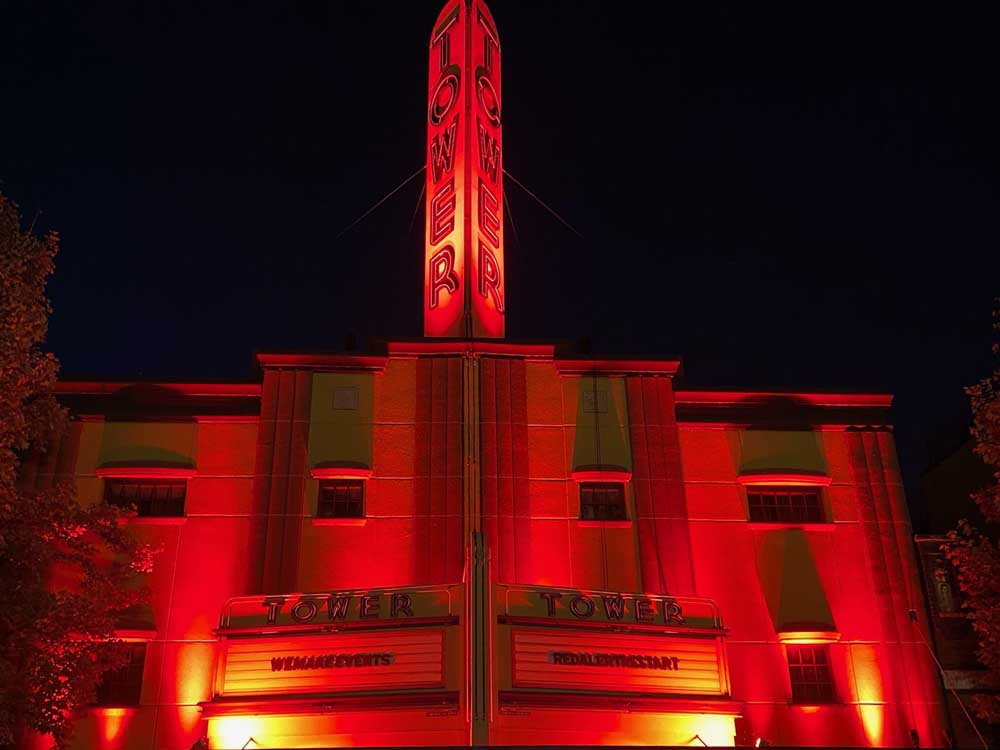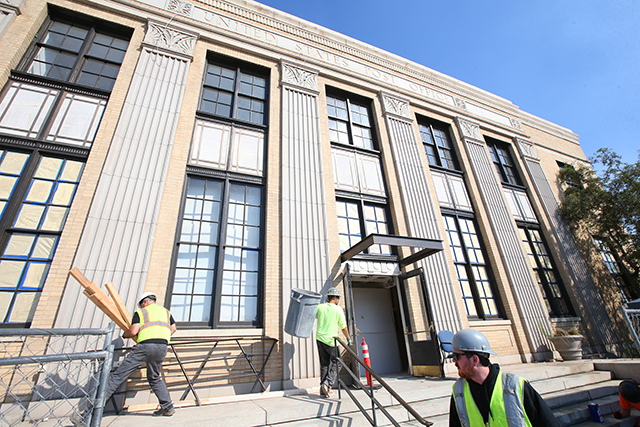Tower lights up for hard-hit music industry, Close to Home revives live music
Published 2:30 am Thursday, September 10, 2020

- The Tower Theatre in downtown Bend.
When COVID-19 hit, the events industry was the first to shut down, and it will be the last to reopen. While many smaller and outdoor venues have reopened with socially distanced shows, the big players in Central Oregon’s music scene — the Les Schwab Amphitheaters, Midtown Ballrooms, Domino Rooms and many more — have remained shuttered. This affects not only the venues and the touring artists, but also the support staff who work behind the scenes to make events possible, including lighting and sound engineers, food and beverage vendors, security staff, stage hands and thousands more. In many cases, these people are independent contractors and have still not seen a dime of unemployment help. This week’s column will, in part, explore what the industry is doing in Oregon to raise awareness of its plight, and its efforts to lobby Congress for legislation to save our stages.
Red alert
Trending
Folks may have noticed the Tower Theatre glowing red the evening of Sept. 1. The historic theater lit up as part of the Red Alert initiative (#redalertRESTART) spearheaded by We Make Events (wemakeevents.org), a coalition of events industry professionals working to raise awareness for the events industry, including live music.
The events industry in the U.S. generates $877 billion according to We Make Events’ website. Also according to the site, 95% of events have been canceled due to COVID-19, and 96% of companies related to the events industry have cut staff and/or wages. Many of these workers are independent contractors, and have been unable to file for unemployment.
The Red Alert received support in Oregon from the Live Events Initiative of Oregon , or LEIO, the state chapter of the national Live Events Coalition. The Tower Theatre, the only Central Oregon venue to officially participate, did so thanks to organizer Courtney Latham, sound engineer and owner of Flip Flop Sounds.
“The goal is to just try to get noticed,” Latham said. “It’s 12 million people (in the event industry) that you never see and don’t know they’re there until something goes wrong at an event. They’re looking for help because their whole industry, the whole thing has gone wrong with COVID. It’s a lot of just trying to get noticed and get some help. And it extends further than just the guys running the sound and the production companies; it goes to venues, it goes to engineers, to roadies, to actual band members.”
Latham said he has lost 97% of his business since lockdowns started in March. The remaining 3% left is weddings, but that has dramatically decreased in scale.
“Most everything we’ve done has been under 100 people, and spaced out and usually ending earlier,” he said. “It’s people wanting to get married regardless, but it’s not the way weddings used to be, that’s for sure.”
Trending
Dwayne Thomas, president of the board of LEIO and owner of Portland-based lighting production company, Greenlight Creative, estimated events make up about $8.5 billion of the state’s total gross domestic product.
“Our active members right now are at about 860, (and) we estimate about 35,000 actual event industry workers in the state,” Thomas said.
These organizations are lobbying Congress to pass the RESTART Act, which has bills in the Senate and House of Representatives. The act includes expanding and extending pandemic unemployment assistance benefits to freelance workers and independent contractors, as well as extending the weekly $600 Federal Pandemic Unemployment Compensation payments, according to a press release from We Make Events.
“This is why you’re seeing buildings go red,” Thomas said. “… We did some pretty focused social media campaigns after the Senate went on recess after the Fourth of July. Our take on things was that we looked real good with all we were hearing from the various states in terms of getting a measure passed. Our problem is, as everybody knows, our relief has been thrown into the bigger Heroes Act on the House side. The Senate has their own proposal that would be an omnibus bill that is much smaller. Neither side is budging, so we’re held captive. We thought when they came back on Aug. 7 it would be a matter of days before a package got signed into law that would benefit us. It’s now the eighth of September, of course they didn’t do it and they went on recess, and here we are. Now we’re upping the ante. Our language has changed from, ‘Can you help us?’ to, ‘You need to do your job.’”
LEIO is planning another Red Alert initiative for Sept. 22. The Tower will once again be involved, and Latham said he hopes to add more venues.
People wanting to help can visit wemakevents.org, leioregion.org or liveeventscoalition.org, each of which has methods for contacting lawmakers as well as petitions, forms and other action items.
Close to Home, mach two
The Sisters Folk Festival may be postponed until next year, but the festival organization is making the best of the situation. After testing the waters Aug. 1 with its Close to Home concert on the lawn of the Sisters Artworks Building, the organization will host three more shows on the original festival dates Friday, Saturday and Sunday (EDITOR’S NOTE: The concerts have been canceled due to hazardous smoke conditions.)
As with the previous Close to Home show, Close to Home 2 will limit capacity to 250 per show. This number includes artists, volunteers, stage workers and vendors, so tickets are capped at 190 per day, with attendees organized in seating pods of two to four people. Food and beverages will be available for purchase, and masks will be required outside of the seating pods.
As of publication, tickets were sold out.
“We are working to reinvent the model of delivering music amidst the current COVID pandemic, while still bringing people together in community and celebrating live music,” Creative Director Brad Tisdel said. “And frankly the first event we did, there was a palpable feeling of connection and almost relief to hear live music again. I think there’s a real human connection when artists perform and audiences get to enjoy their talent, and we all miss it.”
Friday’s and Saturday’s shows will take place from 5 to 10 p.m., while Sunday’s performances will take place from noon to 5 p.m. Four artists will perform each night.
Many of the performers, such as folk troubadour John Craigie and jazz singer Thunderstorm Artis, are familiar faces in Central Oregon. All the artists are from the West Coast, with Friday and Saturday headliner Judith Hill (known for work with Michael Jackson, Josh Groban and others, as well as her solo material) coming up from California. Check the full list of artists for each day below:
Friday
• The Parnells
• AJ Lee & Blue Summit
• Thunderstorm Artis
• Judith Hill
Saturday
• Kristen Grainger and True North
• Thunderstorm Artis
• John Craigie
• Judith Hill
Sunday
• The Jenner Fox Band
• Caleb Clauder & Reeb Willms
• AJ Lee & Blue Summit
• John Craigie








